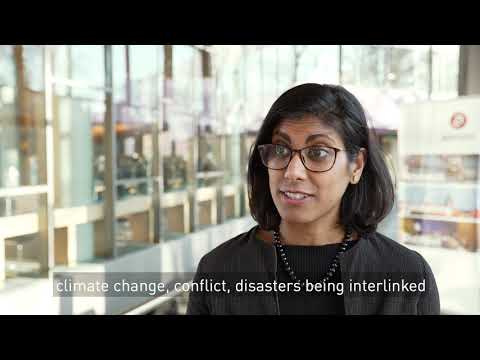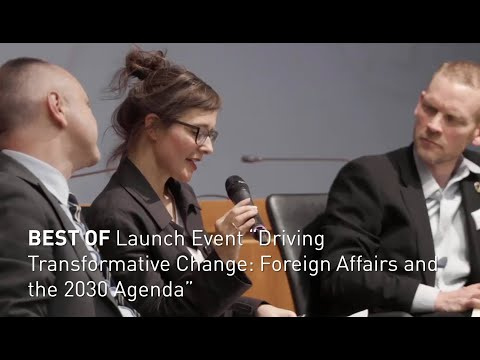Institutions and Governance

Diplomacy and foreign policy communities fulfil the cross-cutting task of overseeing external relations and cooperation in related policy fields, such as peace and conflict prevention, humanitarian and development cooperation and climate policy. A central task of foreign policy is to minimise systemic risks to prosperity, stability and security of states, and build international cooperation to achieve these goals. The discussion on how to tackle climate risks has repeatedly highlighted the role of diplomacy as the only policy area where working on the bigger picture is possible, across geographical, linguistic and cultural borders. Foreign affairs actors can strengthen and shape the level of international cooperation needed to address global problems, through forums such as the UN, G20, G7 and EU. Just as importantly, they can help build relationships and enable cooperation on the ground.
How can we achieve and sustain peace and security when extreme and frequent climate events are the 'new normal'?
Many problems that we would want to address are problems to be better solved by multilateralism. But it is also the same multilateralism that is under threat.
Governance is key
Climate change affects the availability of, access to and management of natural resources. The extent to which institutions can equitably govern and peacefully manage disputes that arise due to these climate-related changes is critical for mediating the risk of localised violence. This is especially so in resource-dependent economies in fragile and conflict-affected states. Many climate-vulnerable countries face the challenges of poor governance and socio-political instability, while climate change as a conflict driver puts additional strain on already stressed governments.
Guaranteeing inclusivity is a key government function in times of climate change in order to ensure good governance and institutions that simultaneously build resilience to climate change, violent conflict and poverty. This requires a move away from inflexible structures grounded in sectoral ‘silos’, as well as the maximisation of the participation of civil society and in particular of marginalised groups. Taking on such an inclusive and broad approach also opens up opportunities to pursue general goals of sustainable development, for example gender equality.
Linking global frameworks
Climate diplomacy promotes integrated policies and programmes by working towards interlinking frameworks within the development, peacebuilding and humanitarian sectors, such as the Paris Agreement and the Agenda 2030.
For example, climate diplomacy can bridge the gap in the achievement of the Agenda 2030 through foreign affairs. The world needs to undergo a deep, transformative change to achieve sustainability and the SDGs constitute a governance tool to realise this. Diplomats and foreign policy makers have a huge convening power to bring together not only different governments but also other sectors, such as the private sector and civil society. Foreign policy makers have the power to connect internal and external dimensions of policy and they can use this to help make both more sustainable by using synergies and sharing best practices.
While climate diplomacy has made significant progress in building global institutions for addressing climate change through the UNFCCC and the Paris Agreement, we still lack frameworks for addressing the concurrent risks of social and political instability, insecurity and conflict that arise from the interaction of climate change with social, economic, demographic and political factors. Climate diplomacy can act as a driving force in achieving that.


Explore the GLOBAL FRAMEWORKS section of our Exhibition on Environment, Conflict and Cooperation.
Linking Paris Agreement, Sendai Framework and SDGs - Interview with Janani Vivekananda
In this video, Janani Vivekananda reflects on major global frameworks for sustainable development. She argues that one has to work across the different frameworks to realise cross-sectorial benefits. Donors - when they design calls and funding allocations - should not restrict themselves to individual frameworks, but should link in the Paris Agreement, SDGs, and the Sendai Framework for Disaster Risk Reduction.
BCSC II: Climate Change and Security: Integrating a Gender Lens | UNSSC
In this video, speakers present case studies that illustrate the different ways that gender inequality shapes the risks for women and men facing climate- and conflict-related challenges. The session aims to offer recommendations for integrating a gender lens into climate-security discussions, debates, context analyses, and programme design. It concludes with an open discussion during which participants are encouraged to engage with the panellists.
BEST OF Launch Event “Driving Transformative Change: Foreign Affairs and the 2030 Agenda”
The implementation of the 2030 Agenda for Sustainable Development can contribute to conflict prevention and promote global stability, and foreign policy has a critical role to play. During a panel discussion at the German Federal Foreign Office, experts discussed the role of foreign policy in the global sustainability architecture, as well as fields of engagement and tools of a new "Diplomacy for Sustainability." In this video, we have put together some of the event’s best moments and key statements.
RESOURCES
Further Reading




